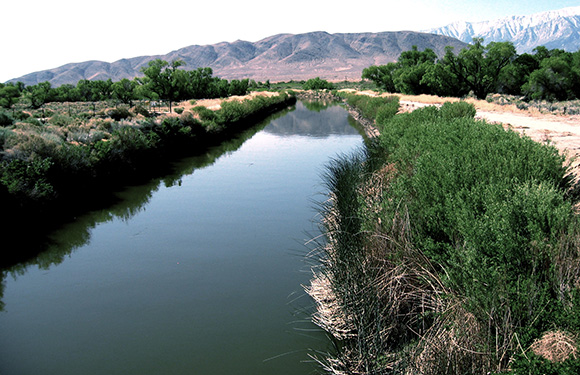
(Photo: Gann Matsuda/Wikimedia Commons)
Clean and reliable water is essential to the health and well-being of families, communities, industries, agriculture and the overall economy of California. Unfortunately, for many rural communities, providing access to this critical resource can be a challenge.
Over the years, cities and large metropolitan areas have been able, through their sizeable customer bases and economies of scale, to finance and build drinking water and wastewater systems that meet the needs of growing populations, serve growing economies, and satisfy an array of environmental and public safety requirements.
Unlike their urban counterparts, however, rural communities have small and dispersed populations. As a result, they often do not have large enough customer bases to be able to make adequate investments in drinking water and wastewater systems. Accordingly, they often struggle to make repairs and improvements to aging infrastructure and, in some places, to address contaminated water supplies. This can create hardships in terms of human health and well-being, as well as the ability to attract new businesses and grow jobs.
Elevate Rural CA has identified such water infrastructure challenges as a key “solution space” in which rural areas, as well as the state as a whole, can be strengthened and lifted through strategically targeted community, workforce and economic development activities.
Rural California’s contributions to the state’s economy are significant, including food production, hydropower, and recreational opportunities. When infrastructure is inadequate in rural communities, it can create health and safety issues for individuals and families and be an impediment to growing living wage jobs and businesses. The consequences can ripple across the entire California economy.
California’s rural areas contain beautiful mountains and forests, lakes and streams, rolling hillsides and stretches of coastline. As such, they constitute desirable vacation destinations, second-home locations and potential sites for business expansions. Yet, without the ability to expand water and wastewater services, rural communities cannot support new hotels for travelers, home construction for new residents, operational needs of businesses and manufacturers, or educational, medical and job training services for the community.
The exact scope of water infrastructure needs for rural areas is difficult to pinpoint. However, a 2018 survey by Rural County Representatives of California sheds light on the magnitude, with community after community citing difficult and unmet needs involving aging facilities or inadequate systems that cannot meet existing or future growth needs.
California’s rural areas also face challenges in managing and sustaining the watersheds that originate in remote forested areas and sustain activities throughout the state, including food production, hydropower and recreation. These upper watersheds constitute “natural infrastructure” that connects to constructed reservoirs and water delivery pipelines crisscrossing the state. Water flowing through these systems supplies cities, suburbs and commercial enterprises from Disneyland to Hollywood to Silicon Valley. It irrigates the farms, orchards and vineyards that feed people throughout California, the nation and the world.
The health of watersheds that originate in forested areas is being threatened by wildfires and related ecosystem damage, as well as a changing climate. Flood management and public safety threats impacting many areas of the state are increasing concerns. Thus, efforts to safeguard these rural waterways and “working landscapes” is critical to California’s economic and social well-being.
The California Economic Summit’s Elevate Rural CA initiative has identified the need to bolster both local water infrastructure and management of forest headwaters as a top priority, along with forest resiliency and broadband access. Promoting safer and more reliable water supplies and economic growth for rural communities is an important goal, along with preserving scenic and productive natural resources. A number of pathways are being explored, including identifying needs within rural communities and exploring innovations in financing and managing rural community infrastructure.
Ensuring a clean, sustainable water supply is critical to creating healthier and more equitable communities, strengthening the economy, and protecting valuable natural resources.
This key prong of the Elevate Rural CA initiative will be discussed and advanced when civic, business and community leaders gather at the 2018 California Economic Summit happening November 15-16 in Santa Rosa.

